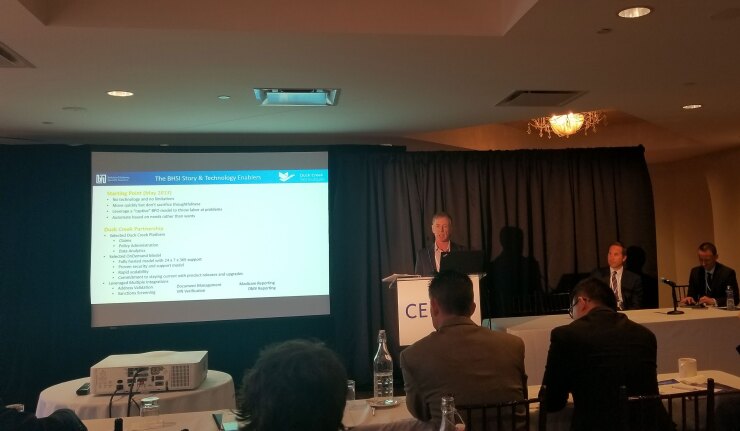Berkshire Hathaway Specialty Insurance was launched five years ago with no IT staff or data infrastructure in place, but also no legacy system to hold back innovation and growth. But the company now sports 800 employees, including 30 in IT, and has grown from $400 million in written premiums in 2013 to $1.7 billion at the end of last year.
With more than 100 products in market, and operations in 11 different countries, CIO Jamie Roser credits the carrier’s quick expansion to its digital strategy centered on vendor partnerships, he said in delivering the opening keynote of insurance tech analyst firm Celent’s annual Innovation & Insight Day in Boston.
“We believe that there are vendors out there with a lot of capabilities and mature technologies,” said Roser. “If you pick the right partner, it’s a huge advantage versus going off and trying to build it yourself.”

After an extensive search in 2014, BHSI deployed Duck Creek’s core platform for underwriting, billing and claims, subsequently ending the days the insurer manually input new policies into Microsoft Word or Excel documents, Rosier recalls. The benefits of the implementation, which is a software-as-a-service model, spanned three months. It features a security model in use by multiple industry peers as well as a central data warehouse the carrier can use to derive business insights for pricing risk.
Also see:
Berkshire opted for a “vanilla” approach in adopting Duck Creek’s automation tools early on, according to Roser. The carrier chose to automate policies and services tied to products that typically result in higher claims volume. A vendor based out of India currently helps facilitate smaller products into market not automated by Duck Creek.
“With our growth projection, we needed to be smart about technology,” Roser said, noting that the insurer has also partnered with third-party vendors to set up HR and payroll functions, among others, across its global enterprise.
Finally, Roser says Berkshire Specialty avoids becoming a legacy insurer by leaning on its vendor partners, and staying current on new software updates. Many of BHSI’s current employees come from other insurance companies, and bring a lot of potential legacy ideas.
"We don’t try to customize the tech,” Roser concluded. “We just configure it to our needs."





